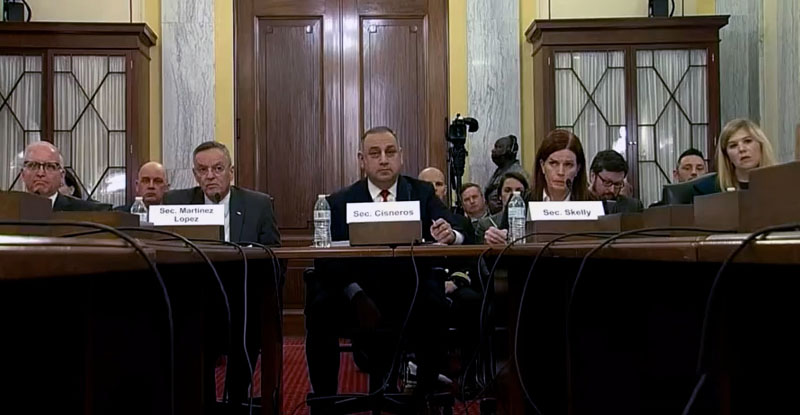Two Senators wondered why 20 pages of the 26-page prepared statement by Defense Undersecretary for Personnel and Readiness Gil Cisneros focused mainly on DEI instead of the recruiting crisis. Cisneros, along with other Pentagon officials, testified on civilian and military personnel programs as they pertain to the fiscal year 2024 Defense Authorization Request before the Senate Armed Services Subcommittee on Personnel on 15 March.
Short video excerpt of Senator Roger Wicker:
–Note that the Pentagon statement said: “diversity, equity, inclusion and accessibility (DEIA)” now bringing the accessibility category under the fold of woke DEI. Ensuring someone in a wheelchair can access a building or a blind person can access a computer is not woke, thus trying to make anyone who is against “DEIA” against accessibility.
Opening Statement by Senator Rick Scott:
He too was disappointed that the Pentagon’s major focus was prioritizing DEI.
As this is the first meeting of the personnel subcommittee this Congress, let me begin by saying that I am very much looking forward to working with you, as we continue the bipartisan tradition of the Armed Services Committee in developing the National Defense Authorization Act.
Every member here is united in supporting our men and women in uniform and their families. This subcommittee has a long history of prioritizing the well-being and morale of our servicemembers and I am eager to be continuing that work as the new ranking member.
Today, the military faces a recruiting crisis. If current trends continue, the Army, Navy, and Air Force will fail to achieve their recruiting missions this year.
The Army and Navy look like they’ll miss the mark by over 10,000 recruits each, while this would be only the third time in history that the Air Force has failed to meet its recruiting mission.
This situation is unprecedented in the fifty-year history of the All-Volunteer Force, and this subcommittee must make it our top priority to do whatever we can to help fix it.
I am concerned that in midst of this challenging recruiting environment the Navy has decided to lower enlistment standards. We have seen this approach tried before and it had disastrous results.
As a Navy vet myself, and the son of a WWII veteran, I know that no job in the military is easy or unimportant. When ships catch fire or are in a collision, as has happened repeatedly in the recent past, every sailor must know how to respond to save lives.
When enlistment standards drop below certain levels, we have seen increased morale and discipline problems, which are accompanied by lower unit readiness. These are not acceptable outcomes. I hope to use this hearing to learn more about what the Navy is doing to avoid the mistakes of the past in this area.
The good news is that as difficult as recruiting is right now, retention levels are generally quite high. That means once people join the military, they tend to like it and want to stay. Military families, in particular, have higher retention rates than single servicemembers.
This is supported by DOD surveys that report married servicemembers with children have the highest levels of satisfaction with the military way of life. So, we need to ask ourselves, why is there such a disconnect between recruiting struggles and retention successes? And what can we do to bridge that gap?
As we continue working to ensure servicemembers and their families enjoy a high quality of life in the military, we need to do more to share their inspiring stories with the rest of the country. Effective use of marketing and advertising must be a priority right now and we need to resource it accordingly. The Department of Defense should also be an advocate for the many benefits that come with military service.
For example, we know that veterans have lower unemployment rates, and higher rates of homeownership, marriage, and educational achievement. Military service sets young men and women on the path to a great life and we need more people to know that.
So, we have major issues facing our military and this subcommittee stands ready to tackle them. That’s why I was excited to take the position as ranking member, because there are real problems like housing, childcare, recruitment and health care that demand our attention.
They aren’t Republican or Democrat issues, they are things that this committee has and must continue to work on a bipartisan basis to fix so that our military members and their families are taken care of. This committee did that last Congress to better protect against and prevent sexual assault. Working together on these important issues allows us to best serve those who serve and protect our nation.
That’s why I was incredibly disappointed when I finally received your prepared statement of several witnesses at 10 p.m. last night and found that a major focus of the Pentagon, I’m sure at the urging of the White House, was prioritizing DEI – basically cultural war issues.
I’ve run big companies. I know the importance of ensuring that we have a workplace, whether in the military or elsewhere, where people can come to their jobs without the threat of being disrespected or discriminated against.
But when it comes to our armed forces, the top question should be this: is every person who wants to join solely focused on the mission of intimidating our enemies and defeating them if necessary?
It’s not about hitting diversity quotas. It’s about being the most lethal fighting force on the planet because the folks who wear the uniform are war fighters, unapologetically devoted to protecting American values and putting that above ALL ELSE.
Our commanders know this and I am gravely concerned that this administration is forcing them to move away from that to achieve some diversity metric that isn’t based on enhancing the lethal fighting capabilities of the American military, but on creating nice talking points for an administration to tout race and gender instead of fighting power and strength.
Do I believe that our military should reflect America and be made up of fighters as diverse as places like my home state of Florida? Absolutely.
But to assert that diversity quotas and pronoun training are more important than the basic needs of recruitment and retention, or caring for the needs of our current force by ensuring proper access to childcare, good housing and health care is outrageous and I think everyone in this room knows that.
So, I look forward to getting to the real issues. Solving problems. Taking care of our members and their families. That will be my focus as ranking member of this subcommittee.
Thank you to the witnesses for appearing before the subcommittee today, and I look forward to your testimony.








Leave a Comment